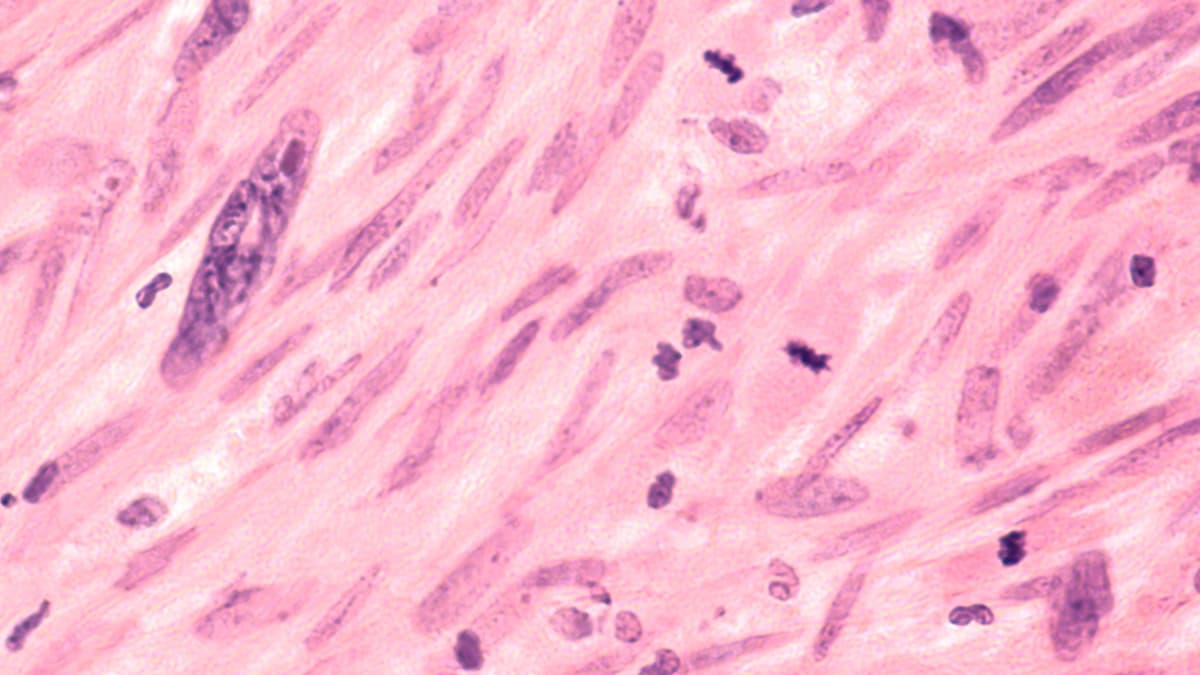Milademetan Does Not Improve Survival Vs Trabectedin in Liposarcoma
Manufacturers plan to halt further development of milademetan for liposarcoma following the publication of topline results from the phase 3 MANTRA trial.
Milademetan (RAIN-32) did not improve progression-free survival (PFS) compared with trabectedin (Yondelis) for the treatment of patients with unresectable or metastatic dedifferentiated liposarcoma, according to a press release from Rain Oncology on topline findings from the phase 3 MANTRA trial (NCT04979442).1
More patients in the milademetan arm underwent dose reductions compared with those in the trabectedin arm in the phase 3 MANTRA trial.

The median PFS among those treated with milademetan was 3.6 months compared with 2.2 months among those treated with standard-of-care trabectedin (Hazard ratio, 0.89;95% CI, 0.61-1.29; P = .53). Based on this, the investigators reported that the trial missed its primary end point of improved PFS.
In the milademetan arm, the most frequent any grade treatment-emergent adverse effects (TEAEs) were nausea, thrombocytopenia, anemia, and vomiting, and the most frequent grade 3/4 AEs were thrombocytopenia (39.5%), neutropenia (25.5%) and anemia (18.6%). Serious AEs occurred in 36.0% of patients receiving milademetan vs 48.1% of those receiving trabectedin.
Overall, 44.2% of patients in the milademetan arm underwent dose reductions compared with 29.1% of those in the trabectidin arm. The rate of toxicity-related discontinuation was 11.6% with milademetan vs 19.0% with trabectedin.
Rain Oncology does not plan to develop milademetan further for this disease subtype, given these topline data. The company hopes to present detailed findings from MANTRA at a future medical conference.
“We are very disappointed in the outcome of the MANTRA trial, as the results did not closely mirror prior clinical results in patients with dedifferentiated liposarcoma,” Avanish Vellanki, co-founder and chief executive officer at Rain Oncology, said in the press release. “We are truly saddened we will not likely be able to offer patients new treatment options for this challenging disease.”
Milademetan is an oral, small molecule inhibitor of the MDM2-p53 complex designed to reactivate p53. The agent yielded antitumor activity in MDM2-amplified liposarcoma and other solid tumors during an earlier phase 1 clinical trial.2 Milademetan also demonstrated promising antitumor activity in the phase 2 MANTRA-2 trial (NCT05012397) for the treatment of select solid tumors with MDM2 amplification.3
In the future, investigators plan to evaluate the agent in combination with atezolizumab (Tecentriq) for the treatment of patients with p53 wild-type advanced solid tumors and CDKN2A loss.
“We continue to believe that reactivating p53 is an important avenue to pursue as part of a treatment strategy across cancer,” Vellanki said.
As part of the randomized, multicenter, open-label phase 3 MANTRA trial, 175 patients with unresectable or metastatic liposarcoma who had progressed on 1 or more prior systemic therapies, including at least 1 anthracycline-based therapy, underwent treatment with milademetan or trabectedin.
Secondary end points included overall survival, disease control rate, objective response rate, and duration of response. The frequency of treatment-related toxicities was another secondary end point.
According to the inclusion criteria, patients were required to have an ECOG performance status of 0 or 1, and adequate bone marrow and hepatic function to be eligible for enrollment.
Patients who received any prior treatment with an MDM2 inhibitor or trabectedin were excluded from the study. Presence of human immunodeficiency virus infection, active hepatitis B or C, or untreated brain metastases were other exclusion criteria.
References
- Rain Oncology announces topline results from phase 3 MANTRA trial of milademetan for the treatment of dedifferentiated liposarcoma. News Release. Rain Oncology Inc. May 22, 2023. Accessed May 23, 2023. https://bit.ly/3IDfSVs
- Gounder MM, Bauer TM, Schwartz GK, et al. A first-in-human phase I study of milademetan, an MDM2 inhibitor, in patients with advanced liposarcoma, solid tumors, or lymphomas. J Clin Oncol. 2023;41(9):1714-1724. doi:10.1200/JCO.22.01285
- Rain Therapeutics provides interim analysis of phase 2 basket trial of milademetan for MDM2-amplified advanced solid tumors (MANTRA-2). News release. Rain Therapeutics, November 4, 2022. Accessed May 23, 2023. https://yhoo.it/3fDWAnD
Sarcoma Awareness Month 2023 with Brian Van Tine, MD, PhD
August 1st 2023Brian Van Tine, MD, PhD, speaks about several agents and combination regimens that are currently under investigation in the sarcoma space, and potential next steps in research including immunotherapies and vaccine-based treatments.